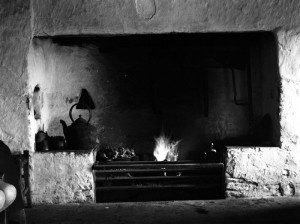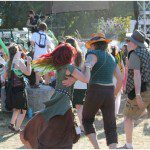
My default assumption is that Paganism is an outdoors activity, but I know that’s a generalisation, and not even entirely true of how I work. I generally meditate indoors, because that’s a lot more practical, especially in winter. I know not everyone can get out comfortably or safely. I also know that many pantheons include gods of the hearth and home who are just as Pagan and just as worthy of respect as any wild god you might find on a windswept hillside.
We need to take our Pagan practices outside to perhaps a larger degree than our ancestors did. This is because our lives largely take place inside buildings and tend to be far more sedentary than would have been the case for most of those who came before us. We need to rebalance our lives by stepping away from the human, to encounter the elements, the land, and to have more visceral and less cerebral experiences. We need to set down the technology for a bit and reclaim our primal, natural selves.
Our ancestors worked out of doors a good deal, their transport was a lot more exposed (feet, beasts of burden). They needed to retreat into the safety and comfort of shelter. They needed those gods of civilization, of skill and intellect, to take them forwards. Their lives were very different from ours.
There are times to stay in, though.
1) If you would put your health at risk by going out, don’t go out.
2) If you need privacy and control of the space – for magic, or deep concentration, don’t go out.
3) If you want to work naked, it’s a much better idea to stay in, to avoid issue 1 and possible arrest!
4) If you are working with deities of hearth and home, there’s no point standing in a field.
5) If you are working with deities of skill, intellect and civilization, you probably won’t find them in a field, either. Libraries, museums, workshops, theatres and galleries may be better temples.
Paganism, to our ancestors, did not mean exclusively nature. It meant a blending of human concerns and natural powers: Gods of war and wisdom, of poetry and politics. The Greeks had city gods, the Romans deified some of their emperors. While our culture has visibly lost its relationship with the natural world, we have also lost our collective sense of the divine being present in human endeavours. As far as I can tell, it is only the Chaos Magicians who focus heavily on gods of technology and innovation. We Pagans tend to be much more drawn to the romance of the nature deities.
Perhaps this is a mistake. Perhaps we spend more time imagining the romance of nature gods and goddesses than we do dealing with the realities of life. Perhaps it is wrong to be out on the hillside seeking the divine, when we fail to look for it in human creativity. My own nature just won’t co-operate with it, though. I can be impressed by a machine or an idea, but it does not have the same impact on me as a sunrise, or a full moon. The irrational, animal, human that I am craves the wide horizons, the dirt and the river, and no amount of fire to play on the wide screen will substitute for actually burning something. Perhaps for others it will be different. There are many ways.
Druid Thoughts is published on occasional Wednesdays on Agora. Follow it via RSS or e-mail!

















